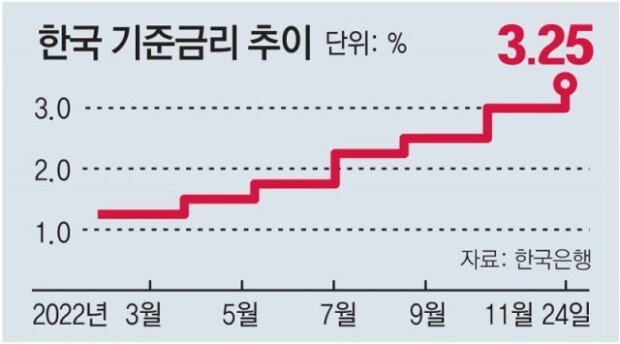BOK lowers next year’s growth forecast to 1.7 percent
BOK lowers next year’s growth forecast to 1.7 percent
Posted November. 25, 2022 07:42,
Updated November. 25, 2022 07:42

The Bank of Korea made a sharp revision to next year’s economic growth forecast down to the one percent range on the assumption that a slowing global economy will constantly dampen export, investment, and consumer sentiment.
On Thursday, the South Korean central bank issued a revised economic outlook for the forthcoming year from 2.1 percent to 1.7 percent, which is lower by as much as 0.4 percent points than the projection made three months ago in August and even below the potential growth rate of around two percent. If the South Korean economy grows less than two percent next year, it will be recorded as the lowest growth since the 2000s began except for the year 2009 during the Global Financial Crisis (0.8 percent) and the year 2020 when COVID-19 spread like wildfire (-0.7 percent). The BOK lowered its projection of the Consumer Price Index (CPI) increase rate to 5.1 percent and 3.6 percent this year and next year, respectively, each of which was cut down by 0.1 percentage points.
The BOK’s Monetary Policy Board on Thursday held a meeting on monetary policies to raise the key interest rate by 0.25 percent points to 3.25 percent in response to the increase rate of the CPI in the five percent range, raising the key rate six times running for the first time since this April. However, experts consider that a smaller increase than last month’s was made, presumably due to concerns over economic stagnation and a rising need for financial stability amid the stagnated capital market.
Likewise, in the following month, the U.S. Federal Reserve may likely put a pause to its surprising upward adjustments, which have already been made as many as four times since this year began. The minutes of the Federal Open Market Committee’s November meeting stated that the majority of the committee members in the meeting considered it proper to slow down the increasing pace of the key interest rate. For the first time since the Fed started increasing the interest rate this March, it mentioned a possible decline in the U.S. economy. Added to this, it made the first comments on the effects on the domestic market that the global economy may have due to a strong dollar, a stagnating Chinese economy, and Russia’s invasion of Ukraine.
The won-dollar exchange rate in the South Korean foreign-exchange market on Thursday dropped by 23.6 won to 1,328.2 won amid the growing expectations of the Fed slowing down its austerity pace.
Min-Woo Park minwoo@donga.com




![“잠만 자면 입이 바싹바싹”…잠들기 전에 이것 체크해야 [알쓸톡]](https://dimg.donga.com/c/138/175/90/1/wps/NEWS/IMAGE/2026/02/23/133404747.3.jpg)

![[단독]타슈켄트 의대 한국인 유학생들, 국시 응시 1년 밀릴 듯](https://dimg.donga.com/c/138/175/90/1/wps/NEWS/IMAGE/2026/02/24/133411228.1.jpg)
